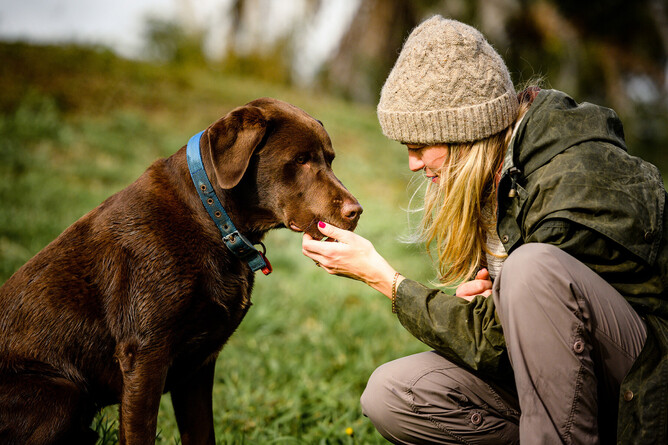Dogs stop eating for many reasons. But what should you do when this happens and at what point should you take your pet to see a professional?
Monitor your pet for the following in the first instance, to check if it is drinking water or eating anything at all. Just like us, there are a variety of reasons dogs might refuse to eat, including:
Fullness
The most common reason for a dog to stop eating is that they might be too full. This can happen if they are eating a diet that has too much fat, sugar, or carbs or is just too big in portion-size.
Taste or texture of food
Your dog might not like the food you’re giving them. For example, if you have only been feeding them dry food and you switch to wet food, it may take time for them to get used to it. Or perhaps the flavour of their food is not working for them.
Illness
A decreased appetite in dogs is often a sign of sickness, especially if your dog is exhibiting other symptoms at the same time. Although a loss of appetite in dogs doesn’t necessarily indicate serious disease, it could be an early sign of illnesses such as cancer, diabetes, pain, liver problems, and kidney failure.
Dental disease
Your dog may not want to eat because something in its mouth is causing pain and they might need to be checked for a broken or loose tooth, severe gingivitis and even an oral tumour.
Recent vaccination
Fortunately, vaccinations are available for many serious and contagious dog diseases. Although these injections have saved many pets’ lives, they do sometimes have adverse effects. The majority of these are minor and brief, including a temporary loss of appetite in dogs.
Travel and unfamiliar surroundings
If your dog’s appetite was fine until you went on a trip with them or moved to a new location, the unfamiliar surroundings may be impacting your dog. Some animals may get motion sickness, and others become nervous or uncomfortable in new places or if other dogs they don’t know are present.
Pickiness or behavioural issues
Some dogs can simply be picky about certain flavours, or they might be in situations where they aren’t comfortable, such as around another dog or eating from a bowl at an uncomfortable height. Because a decreased appetite in dogs may be caused by illness, never assume that your dog is picky without investigating other possibilities first.
If your dog stops eating for a day or two, but is otherwise active and alert, then keep a close eye on them initially and try making some changes to their diet. Here are some tips:
- Offer them some bland home cooked food like boiled chicken and rice, which is a tasty and easily digestible
- Try warming their food up as the temperature may entice them eat
- Pour chicken or beef broth, clam juice, or tuna water over their food to make it more appealing, or just warm water over their dry food to make it softer
- Switch things up for them by feeding your dog dry food if they usually only eat wet food or vice versa, as they could just be bored with their food, or introduce some new flavours into their diet
- Try hand-feeding, as social eaters sometimes just want attention
- Offer smaller meals more frequently
- Take away any leftovers that they haven’t eaten within 15 minutes and offering again a few hours later
- Avoid changing the diet and offering too many different types of food as sometimes too many options can cause an upset tummy, which may complicate matters further
- Be careful to avoid any toxic foods such as onions and garlic
When to seek veterinary attention
If you’ve tried some of these options and your dog has not eaten for two days, is quiet, not acting like themselves, or displaying any other symptoms like vomiting, diarrhea, or lethargy then be sure to seek veterinary attention. You know your dog best and when something’s not quite right, so trust your instincts, get them seen and back to their happy and hungry selves as quickly as possible!




